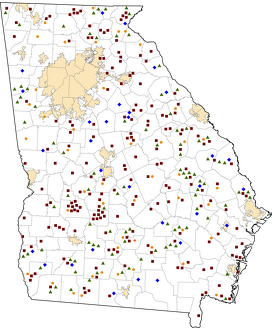Georgia
State Office of Rural Health
Georgia State Office of Rural Health
Phone: 229.401.3081
view details
Georgia Nonmetro Population
10,940,407
Estimated population
1,815,877
(16.6%)
People living in nonmetro areas
Georgia Rural Healthcare Facilities
30
Critical Access Hospitals
1
Rural Emergency Hospitals
94
Rural Health Clinics
192
Federally Qualified Health Centers*
45
Short Term/PPS Hospitals*
*Sites according to data.HRSA.gov (December 2025), showing only locations outside of
U.S. Census
Bureau Urban Areas with a population of 50,000 or more
Last Updated: 2/19/2026
Last Reviewed: 9/15/2025



Selected Social Determinants of Health for Rural Georgia